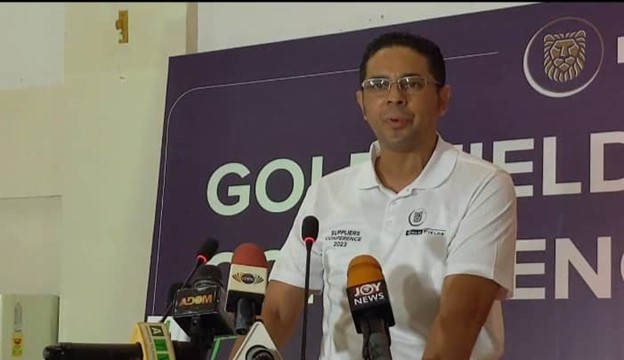Gold Fields Ghana Limited has held a two-day suppliers conference at Tarkwa in the Western Region for its supply chain partners.
The suppliers conference, themed ‘The ESG Culture Change: an Imperative to Building a Resilient Supply Chain through Partnership’, attracted over 300 local and foreign suppliers. Participants deliberated on issues of mutual concern, shared ideas and best practices to navigate global supply chain challenges that directly impact businesses, as well as learnt new trends to improve their business processes.
Topics discussed include contract processes, supply chain management governance and compliance, energy decarbonisation and the people factor in Gold Fields supply chain process, among others.
Panel discussions also centred on “Female empowerment, business ownership and opportunities with Gold Fields, how to conduct an effective emergency evacuation drill, resetting Gold Fields Ghana’s safety performance, emergency preparedness and response – lessons from the Appiatse disaster, among others.

Speaking at the opening ceremony, Lindley Hassler Witbooi, Vice President and Head of Finance of Gold Fields West Africa, said as a major global gold producer, “we depend on our business partners to deliver products and services that are crucial to our mining operations in Ghana. In 2022, we spent US$896million to procure goods and services. Over 90 percent of this amount went to in-country suppliers, who make up 70 percent of our 1,600 active suppliers”.
He recalled that the suppliers conference in 2019 had fruitful conversations and received useful feedback and ideas from suppliers.
“Our intention was to have these interactions annually; but unfortunately, COVID-19 disrupted our plans. After listening to your constructive feedback during the conference in 2019, our supply chain management team reviewed our supply chain strategy. We have restructured and improved aspects of our procurement, tender and payment procedures to ease the process and eliminate bottlenecks that burden our suppliers,” he said.
He continued: “The positive changes and improvements we have made over the past few years are deeply rooted in environmental, social and governance (ESG), which informed the theme for this conference – “The ESG Culture Change: An Imperative to Building a Resilient Supply Chain through Partnership”.
Mr. Witbooi explained that the company’s supply chain strategy supports the development of local businesses through capacity-building, strategic incubation as well as prompt and hassle-free payment for goods and services supplied.
He said Gold Fields has now implemented preferential payment terms for licensed small and medium-scale enterprises that have established offices in the host communities.
“This means that host community SMEs who supply to us will receive payment within 10 to 15 days once they submit a valid invoice. This is a revision from the standard 30-day payment terms and meant to make local businesses competitive and advance socio-economic development in our host communities. So, if you fall within this SME category and you don’t receive payment within 10 to 15 days after submitting a valid invoice, please let us know,” he said.
Also, he said in line with the company’s commitment to ESG, “we are now deliberate about our dealings with businesses owned and led by women. One of our six ESG priorities is gender diversity, which charges us to increase women representation in our workforce to 30 percent by 2030. For us, this goes beyond employing more women; it is also about incubating and empowering female entrepreneurs, business owners and leaders”.
He emphasised that Gold Fields does not intend to unduly prioritise female-owned and women-led businesses to the detriment of other companies. “Once you meet the tender requirements for a job, we will ensure fairness in awarding these contracts. Indeed, helping your businesses grow falls under Gold Fields ESG priority 6, which is Stakeholder Value Creation.”
“As such, our goal is to carry you all along as we explore various opportunities to sustain our mining operations for the long-term benefit of all stakeholders. You must learn about our supply chain procedures, understand the requirements for engaging in tender, be aware of our expectations and, most importantly, be sure to follow them,” he added.
Joshua Donkor, Unit Manager – Contracts of Gold Fields Tarkwa Mine, pointed out that processing goods and services and the right quality, quantity and specification at the right and from the right source is very important.
“Policies and procedures we go through are far transparent and meet all standards,” he said.
Head of Supply Chain at Gold Fields, Theophilus Otchere, for his part, noted that the conference sought to strengthen the good relationship between Gold Fields and its suppliers.










